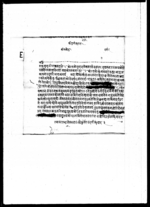A copy of an arjī submitted by Rāmānanda Bā̃ḍā and fellow guṭhī members claiming their right to the harvests and utensil belonging to the Luthāma Guṭhī [VS 1860]
ID: E_2254_0001E
Edited and
translated by Manik Bajracharya
in collaboration with
Pabitra Bajracharya
Created: 2020-09-04;
Last modified: 2022-03-23
For the metadata of the document, click here
The accompanying edition, translation/synopsis and/or commentary are available under the terms of the Creative Commons Attribution-ShareAlike 4.0 International License
Abstract
The petition of which this is a copy was made by Rāmānanda Bā̃ḍā and fellow guṭhī members. It asserts, having reported that Bhājudhana Jaisī had sent a bailiff to collect them, their right to the the Luthām Guṭhī’s harvested grain and utensils.Diplomatic edition
[1r]
1अर्जि \1श्रीदुर्गासहाय: \1श्रीमत्स्येन्द्र१1धर्म२1⟪5⟫1अर्जि¯¯¯ ¯¯¯ ¯¯¯ ¯¯¯ ¯¯¯ ¯¯¯ ¯¯¯ ¯¯¯2हाम्राज्युज्युजीवराजवाडाले¯ ¯१¯कोरथकोलुथाम्विमानगरिचढाएर∙लुथामगूठचढायाकोहो
3तसदिनराजाखुसिभयर∙वाडाकोसवकामगर्नुर¯ ¯१¯कोरथको∙किलासंमठोकनुर∙आफ्नास
4क्य∙वनाउनुगरिआयाकावर्ष भया∙त्योकार्खाना∙अजसंमहाम्रैघरछ∙चौविशहजार[?]पा
5टनलेजान्यैकोछ∙वीचमाहाँ∙कोहिवर्षइजारापर्द्दा∙आफ्नुगूठ∙आफैलेइजाराषानइछानला
6गि∙षेतछो[?]थियोतपनिकामछोड्याकोथिएन[?]हाम्रागूठ[?]
7[?]धनले∙मोहोरगरिखाँदा∙अन्यायपर्याकोथियो[?]¯ ¯१¯को ¯२¯
8चलाउन∙जीवराजकासंतानकनजुन्प्रजाकोगूठ∙उसैप्रजालेचलाउनुभनिमोहोररुक्का
9दस्खत्मंगलभट्टकोवहालि∙भयर∙हामिलेवालिल्यायाको∙आज∙धानलिन∙भाजुधनजैसिले
10हामिलाइप्यादालायो∙जीवराजवाडाकोसंतानभाजुधनजैसिरहेछभन्या∙हामीलाइदंडग
11रि∙वाटा∙पाथि∙फोसि∙भाजुधनजैसिलाइसुपिदियाजाव़स्∙हामि५जीवराजवाडाकासंता
12नरह्याछौंभन्या∙वाटापाथिफोसिहामि∙लाइसुपिदियाजाव़स्∙न्हुहलछिमहाँसभाजोरिदियाजा
13व़स्∙तिनसहरकाप्रजालेआफ्नापुरुषाकोगूठप्रजालेषानपाउनु[?]
14[?]हाम्रापुरुषाको∙गूठहामिलेखाननपाउँदा∙हाम्रोचित्तवुझेनफिर्याद३
15रामानंदप्रभृतिसववाडाकोकुर्नेसवंदगीफिर्याद३
Translation
[1r]
May glorious Durgā helps [us]
Glorious Matsyendra[nātha] - 1
dharma - 2
51
Arjī
Our great-grand father Jīvarāja Bā̃ḍā established the Luthāma Guṭha after he had offered the luthāma [and] vimāna to the chariot of -1- (i.e., glorious Matsyendranātha). That day the king was happy. It has been ...2 years since [the guṭha members started] carrying out all the tasks of the Bā̃ḍās,[everything] down to hammering nails into the chariot of -1- (i.e., glorious Matsyendranātha) and repairing [damaged parts] to the best of their ability. The workshop has been in our own house to this day. This is known to Patan, [the city of] the twenty-four thousand [people/households]. Meanwhile, when the ijārā [system] was imposed [the guṭha] for some years, we, not wishing to enjoy [the material benefits of] the ijārā [contract] for our own guṭha, let go of the plots [belonging to the guṭha]. We did not, however, discontinue services [to the guṭha]. We were treated unjustly when Bhājudhana took our guṭha by having a mohara issued. In order to perform -2- (i.e., dharma, pious acts) [to the glory] of -1- (i.e., glorious Matsyendranātha), a mohara3 , rukkā daskhat4 , and assignment of rights (bahāli) by the Maṃgalabhaṭṭa were issued to the descendants of Jīvarāja, stating: "The subject to whom a guṭha [owes its existence] should manage it." We then received the harvests [from the plots belonging to the guṭha]. Today Bhājudhana sent a bailiff (pyādā) to us to collect the unhusked rice [harvested from the guṭha plots]. If it turns out that Bhājudhana Jaisī is a descendant of Jīvarāja Bā̃ḍā, let us be punished, and let the bāṭā5 , pāthi6 and phosi7 be handed over to him. If we 5 turn out to be Jīvarāja's descendants, let us be given the bāṭās, pāthis and phosis. Let there be an assembly organized at Nhuhalachi. The subjects of the three cities8 have the right to enjoy their ancestral guṭha, but we have not been allowed to enjoy this right. We are, therefore, displeased. Complaint! complaint! complaint!
Salutations and praises of Rāmānada and all other Bā̃ḍās. Complaint, complaint, complaint.
Commentary
This document is a petition made by Rāmānanda Bā̃ḍā on behalf of five members of the Luthāma Guṭha including himself. It does not mention the date or the name of the authority to whom the petition was submitted. Based on other documents in the series, though, the year can be determined to have been VS 1860 (1803 CE). From the document, it is apparent that Rāmānanda had been able to collect the harvest yield on the guṭha plots, overseership of which had been restored to him earlier that year. Bhājudhana, the previous overseer of the guṭha, however, sent a bailiff to collect that yield from him. This document was submitted in reaction to this act.

